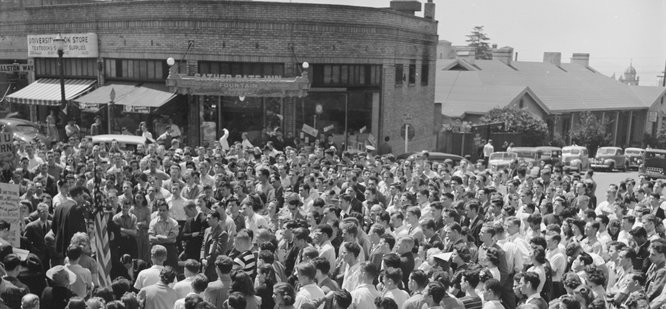Americans Were War-Weary Long Before Iraq
Americans Were War-Weary Long Before Iraq

“America may have lost its stomach for military intervention,” Charles Blow wrote recently in the New York Times. At least among Obama supporters, that has become the most common explanation, hardening into cliché, for why the president’s call to punish Assad’s regime for gassing its own citizens met with a curdled mixture of anger and apathy. After a dozen years of fighting and paying for two long and frustrating conflicts in Islamic lands, Americans are just weary—and wary—of engaging in a third.
Fortunately, the idea that Americans have traditionally been a war-loving people is false.
Behind this notion lurks the assumption that the reluctance to bomb Syria is a historic anomaly. Haven’t Americans always been willing, if not necessarily eager, to follow their presidents into the fray? For most liberals and some conservatives, that gung-ho attitude is hardly a virtue. Few of us would now agree with Theodore Roosevelt’s view that “By war alone can we acquire those virile qualities necessary to win in the stern strife of actual life.” Still, who can argue with historical truth?
Fortunately, however, the idea that Americans have traditionally been a war-loving people is false. In fact, over the past two centuries, large numbers of citizens sought to stop presidents from initiating nearly every major and minor conflict and then protested most of those interventions once they began.
A few of the more salient examples from the nineteenth century: In New England, the Federalists—then one of the two major parties—so detested James Madison’s prosecution of the War of 1812 that they planned to make a separate peace with Britain. In the mid-1840s, the war with Mexico generated a huge resistance movement, both inside and outside Congress. It included such figures as Henry David Thoreau (who went to jail instead of paying his poll tax) and a first-term Whig congressman by the name of Abraham Lincoln. During the Civil War, both the Union and the Confederacy had to grapple with internal dissenters, some of whom conveyed their objections with muskets and swords.
The armed rise of the United States to world power in the twentieth century was fiercely contested all along the way. The Democrats focused their 1900 campaign on opposition to the ongoing war of conquest in the Philippines. In early 1917, the public’s desire to stay out of the First World War was so widespread that peace activists demanded a popular referendum on the question, which they thought they had a decent chance to win. Until Charles Lindbergh started accusing Jews of seeking to pull the United States into the Second World War, his America First Committee was an ideologically diverse group with some 800,000 paid members. The throngs that railed against the wars in Indochina and forced an end to the draft belonged to the most successful of all the peace movements. If hundreds of thousands of protesters had not flocked to the Mall starting in 1965, Lyndon Johnson would likely have been elected to a second term, and Richard Nixon might never have had a first one.
The only wars Americans have almost universally supported have been those that began with an attack on the nation: Pearl Harbor and 9/11. And by the time Obama’s “surge” in Afghanistan ended in mid-2012, half the public wanted him to accelerate the withdrawal of U.S. troops. Even brief offensives like the Army’s “punitive expedition” in Mexico that Woodrow Wilson ordered in 1916 and Ronald Reagan’s proxy wars in Central America in the 1980s stirred mass demonstrations and outrage in Congress.
It is thus the current distaste for intervention in Syria that keeps faith with American tradition. Obama is just the latest president who has struggled to justify using force in ways that confuse or enrage millions of his fellow citizens. He insists, like several of his predecessors, on the need to protect national security and the national interest; he refrains from calls to make the world “safe for democracy” or defending the national “honor.” But he too has learned that when the nation’s leader asks Americans to rally around the flag of war, the call is received more as an option than an obligation.
We ought to welcome that fact. A majority of Americans disapproved Obama’s bombing plan in their minds, not their stomachs. However inchoately, they insisted, like many of their ancestors, that the president—and the politicians who support him—make a lucid, absolutely convincing argument about why Americans should risk their lives and treasure to pursue a policy that will lead to killing people in another county and destroying places where they work and live. War might be politics by other means, but it also reveals that the kind of politics we should be practicing has failed.
Michael Kazin is the editor of Dissent.






